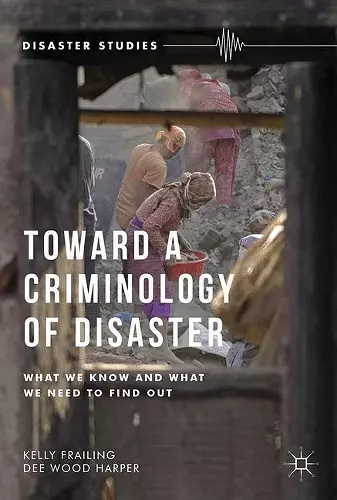Toward a Criminology of Disaster
What We Know and What We Need to Find Out
Dee Wood Harper author Kelly Frailing author
Format:Hardback
Publisher:Palgrave Macmillan
Published:11th Jul '17
Currently unavailable, and unfortunately no date known when it will be back

"The intersection of disasters and criminology is a vastly underdeveloped area of scholarship that is explored in-depth by Frailing and Harper. Of particular interest is the application of criminology theories to frame explanations for post-disaster behaviors such as property crime, interpersonal violence, and fraud. This infusion of criminology theories into disaster social science has the potential to make significant contributions to our understanding disasters, as well as criminology." (Duane A. Gill, Professor and Interim Head of Sociology, Oklahoma State University, USA) "A careful, thoughtful, theoretically-informed analysis of what is known about various types of crime in the context of disaster - required reading for criminologists and disaster researchers alike." (Kathleen Tierney, Professor of Sociology, University of Colorado Boulder, USA) "For decades researchers have illuminated the bright side of disaster-enhanced community solidarity, increased helping behavior, and societal resilience. This book, in contrast, shines a bright light on the dark side of disaster-price gouging, domestic violence, and corporate wrongdoing. The authors have done a masterful job synthesizing seemingly disparate fields of study into a criminology of disaster. This book will appeal to a wide and diverse audience, including those interested in criminology, sociology, disaster studies, homeland security, and emergency management." (Gary R. Webb, Professor and Chair of Emergency Management and Disaster Science, University of North Texas, USA)
abcThis book puts forward a comprehensive criminology of disaster by drawing - and building - upon existing theories which attempt to explain disaster crime. Although antisocial behaviour in disasters has long been viewed as a rarity, the authors present ample evidence that a variety of crime occurs in the wake of disaster. Frailing and Harper's explorations of property crime, interpersonal violence and fraud during disaster reveal the importance of methodological approaches to understanding these phenomena. They highlight the need for the application of social disorganization, routine activity and general strain theories of crime in the development of disaster crime prevention strategies. An accessible and detailed study, this book will have particular appeal for both students and scholars of criminology, sociology, disaster studies and emergency management.
ISBN: 9781137469137
Dimensions: unknown
Weight: 4199g
224 pages
1st ed. 2017